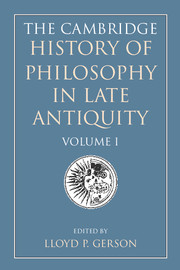Book contents
- Frontmatter
- General introduction
- I Philosophy in the later Roman Empire
- II The first encounter of Judaism and Christianity with ancient Greek philosophy
- III Plotinus and the new Platonism
- IV Philosophy in the age of Constantine
- V The second encounter of Christianity with ancient Greek philosophy
- Introduction to Part V
- 24 Basil of Caesarea
- 25 Gregory of Nyssa
- 26 Gregory of Nazianzus
- 27 Calcidius
- 28 Nemesius of Emesa
- 29 Synesius of Cyrene
- 30 Marius Victorinus
- 31 Augustine
- Map 1 The Byzantine Empire, c. 500
25 - Gregory of Nyssa
from V - The second encounter of Christianity with ancient Greek philosophy
Published online by Cambridge University Press: 28 May 2011
- Frontmatter
- General introduction
- I Philosophy in the later Roman Empire
- II The first encounter of Judaism and Christianity with ancient Greek philosophy
- III Plotinus and the new Platonism
- IV Philosophy in the age of Constantine
- V The second encounter of Christianity with ancient Greek philosophy
- Introduction to Part V
- 24 Basil of Caesarea
- 25 Gregory of Nyssa
- 26 Gregory of Nazianzus
- 27 Calcidius
- 28 Nemesius of Emesa
- 29 Synesius of Cyrene
- 30 Marius Victorinus
- 31 Augustine
- Map 1 The Byzantine Empire, c. 500
Summary
LIFE AND WORKS
Gregory came from a large, prosperous and Christian family in the Roman province of Cappadocia in modern Turkey. About the exact year of his birth it is hard to be precise, but it was probably between 335 and 340. His father, Basil the Elder, taught rhetoric in Pontic Neocaesarea and his mother Emmelia herself came from a Christian family and was herself the daughter of the elder Macrina, who had received her faith from Gregory the Wonder Worker (c. 213–c. 270 ce), the so-called Apostle of Cappadocia, who had been a pupil of Origen in Palestine. Gregory himself had eight siblings, two of whom, Macrina and Basil, had a great influence upon him. Of the former he wrote The Life of Macrina (GNO VII/2: 370–414) and of the latter a panegyric, On his Brother Basil (GNO x/1: 109–134). The influence of both is discernible in Gregory’s more theological writings. In the case of his sister in On the Soul and Resurrection which takes the form of a deathbed dialogue with his sister with distinct echoes of Plato’s Phaedo with its account of the death of Socrates. In the case of Basil in his treatise On the Six Days of Creation, at the beginning of which (PG 44.61b) he explicitly acknowledges his debt to ‘the great Basil’. Basil had composed for the Easter of 375 nine sermons bearing the same title. Gregory’s treatment is more positive to philosophy than is that of his elder brother.
Information
- Type
- Chapter
- Information
- The Cambridge History of Philosophy in Late Antiquity , pp. 471 - 481Publisher: Cambridge University PressPrint publication year: 2000
Accessibility standard: Unknown
Why this information is here
This section outlines the accessibility features of this content - including support for screen readers, full keyboard navigation and high-contrast display options. This may not be relevant for you.Accessibility Information
- 54
- Cited by
